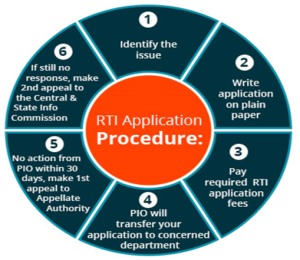Why in the news?
- Despite the issues existing such as late OTPs and Payment failures, the number of online RTI queries showed a rise.
Right to Information (RTI) Act, 2005
- The RTI Act came into force with effect from October 2005.
- RTI is an act of the parliament of India which sets out the principles and techniques in regards to citizens’ right to information. It supplanted the previous Freedom of Information Act, 2002.
- Ministry – Department of Personnel and Training, Ministry of Personnel, Public Grievances and Pensions.
- Objective – Empower the citizens, promote transparency and accountability in the working of the Government, contain corruption, and make our democracy work for the people in real sense.
- Significance of Act:
- It protects the fundamental rights to Freedom of Expression and Speech under Article 19(1)(a) and Right to Life and Personal Liberty under Article 21 guaranteed by the Constitution.
- Exceptions Under Second Schedule of Act:
- Security agency like Intelligence Bureau , Research and Analysis Wing, Directorate of Enforcement, National Technical Research Organisation.
- Strategic Forces Command.
- Defence Research and Development Organisation (DRDO) and Border Roads Development Board.
- Computer Emergency Response Team (CERT – In)
- Major Changes brought by 2019 Amendments:
- Term: Term is no longer fixed in law at 5 years. Instead, the term of office will be “such term as may be prescribed by the Central Government.”
- Salary and Allowances: Under amendment, salaries, allowances, and other terms of service of both central and state level CIC and ICs will be as “may be prescribed by the Central Government.” They are no longer statutorily fixed.

